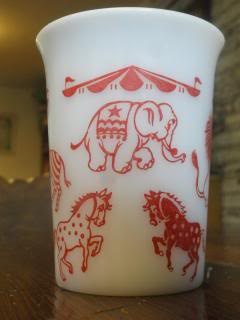
I've just been reading a wonderful introduction by Ray Bradbury to a book of his short stories, and it really reminded me of this thread. He says that all his writing is inspired by exactly the kind of openness to new experiences that people have been discussing here. This paragraph really stood out for me:
In other words, I was not embarrassed at circuses. Some people are. Circuses are loud, vulgar, and smell in the sun. By the time many people are fourteen or fifteen, they have been divested of their loves, their ancient and intuitive tastes, one by one, until when they reach maturity there is no fun left, no zest, no gusto, no flavor. Others have criticized, and they have criticized themselves, into embarrassment. When the circus pulls in at five of a dark cold summer morn, and the calliope sounds, they do not rise and run, they turn in their sleep, and life passes by.It's so easy to imagine a parent vocally hating the circus, because the music's too loud, and the tickets are a rip-off, and the candyfloss is nothing but sugar...(Ray Bradbury)

Sandra Dodd:
It didn't matter much in my life (so far) that I didn't love jazz. None of my kids picked it up. If I were pressed to choose jazz, I would go with Dixieland first, then Chicago big-band stuff, and last, last only if I had to, progressive jazz. It seems to keep my heart from beating properly.Marta Pires:My best childhood friend was a piano prodigy. No one in our small town could teach her after she was 13 or so and her mom used to drive her 90 miles to the university for lessons, where she discovered jazz. She tried to explain it to me one day when I was 15, about how it wasn't so much about keys and chords as lines and patterns. I didn't get it.
I have a feeling of inferority about it—that and science fiction. Many of my brightest friends love jazz and science fiction, and I don't. They don't understand why not. I don't either, except there are so many other things I like so much better!
Something I liked better than anything, though, is being as good a mom as I could be, and so since my kids weren't going to have teachers at school to validate their interests or to introduce them to things I "hated," I decided not to hate anything, and to leave as much of the world accessible to my kids without them feeling they were messing with something I didn't like, or asking about something I disapproved of.
When I reject something from my life, it closes doors, in my head, and in my soul. I can't make connections there anymore. I have eliminated it from active play. It's not good for unschoolers.
Everyone has the freedom to be negative. Not everyone has thought of good reasons to be more positive.
I just wanted to add that I can totally relate to what you wrote about openness (or should I say about the contrary, the closing of the mind and of the soul). As I was reading this thread on facebook and kept reading and thinking about the word "hate", I could literally *feel* something closing inside, as opposed to when we were chatting about this topic last week, when I could *feel* myself opening up and feeling lighter and happier and more excited to be alive and to have so many paths I can go down with my daughter and husband! 🙂I wonder if it has to do with personality traits or with past experiences or with a specific type of intelligence... For instance, I can see learning in everything and I can't imagine myself hating anything. Disliking, yes, but not hating. I don't remember ever being any different.
What I'm starting to realize (by what I've been reading and learning, and by my own observations of my experience), is that we can most certainly choose alternatives that can lead us to more openness (like choosing more positive words to describe how we feel about something, or genuinely trying to relax and see what our children and partners see in something they like, etc.). And that if we do it often, we can probably rewire our brains, creating new neurological paths and becoming indeed more open.
end of Marta quote

[I] would first state that my child isn't a circus monkey.I responded:
Some kids are more monkey than their parents are. When that happens, it can be invigorating to find an adult who will converse and joke with a kid, even if it's not something the parents would have chosen.Openness to experience is what it's called—interest and curiosity. Being willing to explore, to try new things, to open upwards and outwards.
Some people don't have that, and some people do. Some people have a little. Some have LOTS, and if a child who has lots of openness to experience has parents who are less so, he might be sometimes desperate for some other-people exchanges.
So don't assume that just because a parent thinks things are irritating or boring or oppressive or schoolish that a young unschooled child will have ANY of those same "sensibilities" (prejudices and resentments) that the parent has.
Parents who either don't have a natural dose of "openness to experience" (it's inherited—it's a genetic trait just as curly hair or long toes are) should try to either find as much as they have, or learn to appreciate it in others. Parents who had it as a kid and had it dulled down and discouraged to the point that as adults they feel embarrassed or ashamed if they're feeling a desire to get excited about a My Little Pony or a poop joke or a flower they've never seen—that should be the first aim in deschooling: recover that joyous curiosity. Restore your wonder.
For years people have been saying "anyone can unschool," but I don't think it's as true as I once thought it might be.Note in 2022:I assumed (as others do, I think) that lack of energy and creativity were all damage done to an otherwise "normal" (ideal) psyche/personality.
But researchers are finding that it seems some people are born super curious, and others pretty passive!
So in 100 years, people might be able to have a blood test early in life and know whether they need a curriculum or just to hang out and play video games and play with the dog. (I'M JOKING, mostly. They won't have the same kind of video games in 100 years.)
Alex [Polikowsky] wrote: "I can get excited by little things!!! My mom and dad are like that. I am like that!"2022 update continued:It's genetic. A "heritable trait" (something someone can be born with, because their parents had it, like hair texture or eye color). "Openness to Experience," they call it.
Those who have lots of it, and whose kids have lots, will find unschooling richer and easier.
But some who are born with that have it extinguished by school or negativity of one sort or another. So sometimes it can be re-ignited, which is what deschooling is about for lots of people. And those who don't have much of it should fake it—schedule things, make lists of things to do and explore.
Openness to Experience, at Wikipedia
If there's a family with none of it, if neither parent gives a rat's ass about racoons or armadillos or kangaroos, and the kids can't be bothered to get up to look out the window at a hot-air balloon or the northern lights, they should NOT be unschoolers.
(original)


